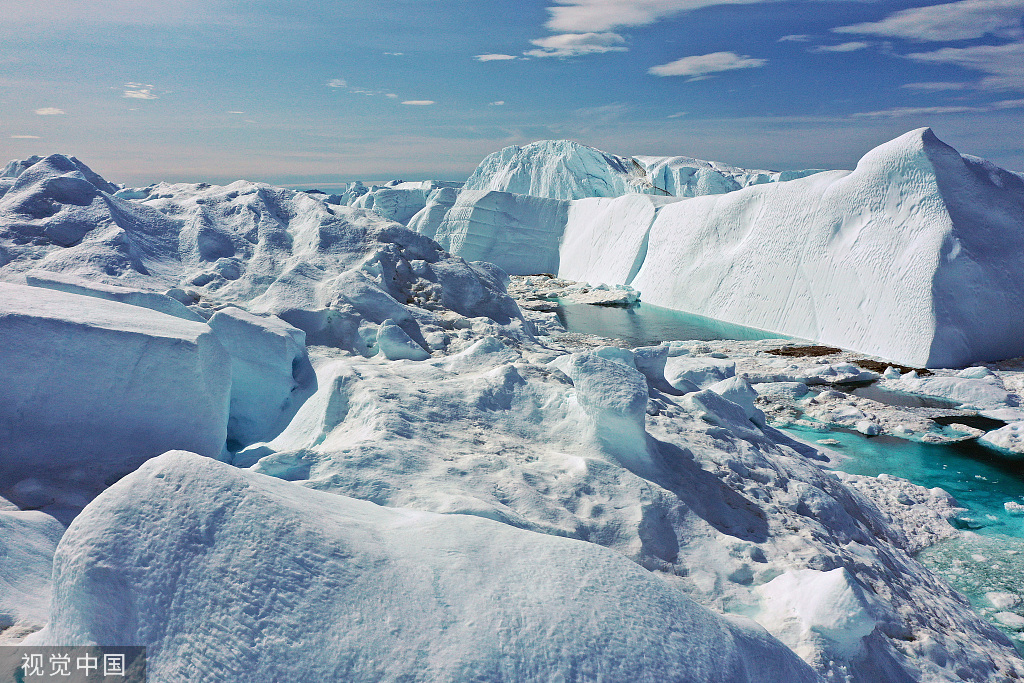How much growth is enough for human need?
By OP Rana | China Daily | Updated: 2020-08-24 07:42

Seven Olympic-sized swimming pools. That's what the water from the melting ice sheet in Greenland last year would have filled every second. In absolute terms the Greenland ice sheet shrank by 532 billion tons in 2019, equivalent to a million tons per minute.
Scientists led by Ingo Sasgen, of the Alfred Wagener Institute in Bremerhaven, Germany, attributed the extreme loss last year (double the annual average since 2003) to "blocking patterns" of weather that kept warm air over Greenland for longer periods due to worsening climate change.
At this rate, Greenland could soon become the "green land" of Eric the Red, the Norwegian who navigated and explored Greenland at the turn of the last millennium and is said to have sold swathes of the island as "green" and therefore highly fertile land.
The scientists, whose study was published in the Communications Earth& Environment journal used data from NASA's Grace satellites which, by taking gravity measurements, weighs the mass of ice in Greenland.
Climate change is heating the Arctic at double the rate and the ice cap is the single largest contributor to rising sea levels. Catastrophically, the sea levels would rise by up to six meters if the entire Greenland ice sheet melts. The only consoling thought is that the scientists are not yet certain whether the ice sheet has passed the point of no return, although it could take centuries to slow the melting even if carbon emissions are reduced.
Not surprisingly, it is such conjectures of scientists-that it could take centuries to slow ice melting even if emissions are reduced-that climate skeptics and self-proclaimed saviors of the Earth and benefactors of humankind latch onto to claim that climate alarmism prevents us from working out and implementing smart climate solutions.
For example, they claim that instead of trying to reduce carbon emissions to keep the global temperature rise to below 2 degree Celsius in a bid to prevent the impending climate cataclysm, the world should carry on business as usual to further boost global economic growth, because the more wealth we (read big business) create the better we can deal with climate issues.
Unusually heavy downpours over longer periods of time and the ensuing floods, which large parts of China have been battling with this summer, can be effectively tackled with higher economic growth, they claim. Faster wealth generation is also the solution to droughts, wildfires, more frequent cyclones, receding lakes and underground water tables, vanishing forests and accelerating desertification.
And far from being treated as a climate emergency that demands immediate corrective measures, Greenland's melting ice sheet is cause for celebration in many circles as it will open new, shorter and hence more profitable trade routes. As for rising sea levels, they are a minor irritant as they will displace only a tiny percentage of the global population, a problem that can be solved by further exploiting Mother Nature-extracting more minerals, chopping down more forests, depleting and contaminating more water sources, and emitting more toxic gases.
Anyway, climate change is not the highest concern of a majority of people around the world. In fact, they may be more concerned about mobile phones and internet access than climate change. Of course, at the moment, people's biggest concern is the novel coronavirus, which poses a serious threat to human health and life.
Yet the general public may not be aware of the havoc climate change has been wreaking on the world and by default on the people-and the level of destruction it will cause in the future. They may also be unaware that the hundreds, if not thousands, of types of bacteria and viruses buried in the ice sheets, glaciers and permafrost for thousands of years will be released in the atmosphere once they melt.
Worse, some of these viruses could be many times deadlier than the novel coronavirus, and a few of the bacteria released by the melting ice sheets and glaciers could have a much higher fatality rate than mycobacterium tuberculosis that claims more than 1.7 million lives a year.
Similarly, by chopping down forests, we could release undiscovered bacteria and viruses into the atmosphere against which we may not have any defense-and it could take decades for us to develop antidotes for them. For instance, we are yet to find a permanent cure for cancer, although we know the viruses, the usual infectious agents, which cause cancer, and that other pathogens such as bacteria and parasites also a play a role in the disease.
Since we know that among the inevitable consequences of unfettered economic growth is continuous chopping down of forests and melting glaciers, ice sheets and permafrost, the decision is for us to make whether to continue with business as usual in the hope that accumulation of more wealth will solve all our problems or choose to change our perception of growth and aim for sustainable development that will protect nature and therefore human life.
The author is a senior editor with China Daily.
























